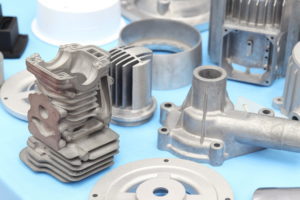Little Known Questions About Stahl Specialty Company.
Little Known Questions About Stahl Specialty Company.
Blog Article
9 Simple Techniques For Stahl Specialty Company
Table of ContentsOur Stahl Specialty Company IdeasThe smart Trick of Stahl Specialty Company That Nobody is DiscussingSome Of Stahl Specialty CompanyLittle Known Facts About Stahl Specialty Company.Some Of Stahl Specialty Company
Chemical Comparison of Cast Light weight aluminum Alloys Silicon promotes castability by lowering the alloy's melting temperature level and enhancing fluidity during casting. Additionally, silicon adds to the alloy's toughness and wear resistance, making it valuable in applications where resilience is essential, such as automotive components and engine elements.It likewise enhances the machinability of the alloy, making it easier to process into completed items. This way, iron adds to the general workability of light weight aluminum alloys. Copper boosts electric conductivity, making it beneficial in electric applications. It likewise enhances deterioration resistance and contributes to the alloy's overall toughness.
Manganese adds to the toughness of light weight aluminum alloys and boosts workability. It is commonly made use of in wrought light weight aluminum products like sheets, extrusions, and profiles. The visibility of manganese aids in the alloy's formability and resistance to splitting during fabrication processes. Magnesium is a light-weight component that provides strength and effect resistance to aluminum alloys.
It allows the manufacturing of lightweight parts with exceptional mechanical homes. Zinc enhances the castability of aluminum alloys and assists regulate the solidification process during spreading. It boosts the alloy's strength and solidity. It is usually found in applications where intricate forms and fine information are essential, such as decorative castings and specific automobile components.
Some Known Factual Statements About Stahl Specialty Company
Due to the fact that aluminum-silicon alloys have excellent casting homes, high gas properties, basic processes, and exceptional rust resistance, aluminum-silicon alloys are most generally utilized in the die-casting market in your home and abroad. At the same time, aluminum-silicon alloys are additionally reasonably very early and commonly recognized alloys developed and used in die-casting. After continual research study and renovation, the majority of the current global mainstream aluminum-silicon alloys have been settled and are absolutely nothing greater than A356, A360, A380, ADC12, B390, and A413.
The primary thermal conductivity, tensile toughness, yield toughness, and elongation differ. Select suitable basic materials according to the performance of the target item created. Among the above alloys, A356 has the highest possible thermal conductivity, and A380 and ADC12 have the lowest. The tensile restriction is the opposite. A360 has the very best yield strength and the greatest elongation price.

The smart Trick of Stahl Specialty Company That Nobody is Talking About
In precision casting, 6063 is fit for applications where detailed geometries and high-grade surface area finishes are paramount. Examples include telecommunication rooms, where the alloy's exceptional formability enables streamlined and visually pleasing designs while keeping architectural integrity. In the Illumination Solutions industry, precision-cast 6063 parts produce classy and effective lighting components that need intricate shapes and great thermal efficiency.
(https://www.openlearning.com/u/franceshoward-sofv17/about/)
It results in a finer surface area finish and better corrosion resistance in A360. The A360 shows premium prolongation, making it excellent for facility and thin-walled parts. In accuracy spreading applications, A360 is appropriate for markets such as Consumer Electronics, Telecommunication, and Power Tools. aluminum metal casting. Its enhanced fluidness permits complex, high-precision elements like smartphone casings and interaction gadget housings.

In precision casting, light weight aluminum 413 radiates in the Customer Electronic Devices and Power Devices sectors. This alloy's remarkable deterioration resistance makes it an excellent choice for outdoor applications, making sure long-lasting, durable items in the discussed markets.
Not known Details About Stahl Specialty Company
The light weight aluminum alloy you choose will considerably affect both the spreading process and the residential or commercial properties of the last product. Because of this, you need to make your decision meticulously and take an educated approach.
Figuring out the most ideal aluminum alloy for your application will certainly imply considering a wide selection of qualities. These relative alloy attributes follow the North American Pass Away Casting Organization's standards, and we've split them right into two click here for info groups. Foundry. The very first category addresses alloy features that influence the manufacturing procedure. The 2nd covers characteristics impacting the residential or commercial properties of the last product.
The alloy you pick for die casting directly impacts numerous facets of the casting process, like just how very easy the alloy is to work with and if it is susceptible to casting flaws. Warm cracking, also referred to as solidification splitting, is a regular die casting defect for aluminum alloys that can lead to internal or surface-level rips or cracks.
8 Easy Facts About Stahl Specialty Company Described
Certain light weight aluminum alloys are a lot more susceptible to hot breaking than others, and your choice must consider this. One more typical problem found in the die casting of light weight aluminum is pass away soldering, which is when the actors stays with the die walls and makes ejection difficult. It can harm both the cast and the die, so you should search for alloys with high anti-soldering buildings.
Rust resistance, which is currently a noteworthy quality of aluminum, can vary substantially from alloy to alloy and is a necessary characteristic to take into consideration depending upon the environmental conditions your item will be revealed to. Use resistance is an additional building frequently sought in light weight aluminum items and can set apart some alloys.
Report this page